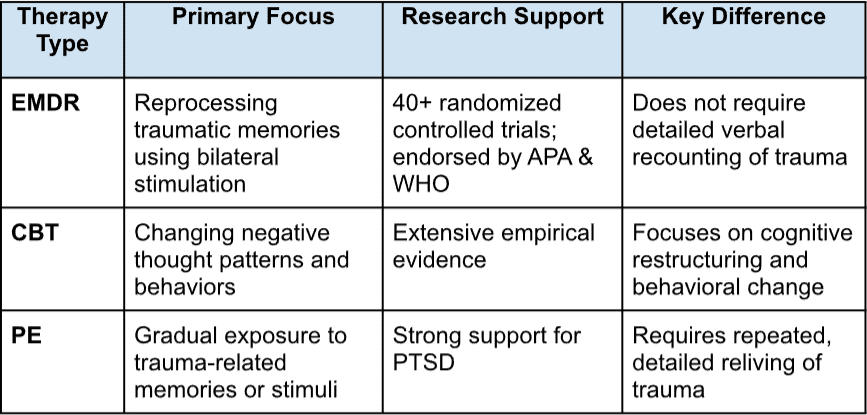EMDR therapy is not considered an experimental therapy, but rather a modality with solid scientific backing. However, many people exploring trauma-focused therapy wonder if EMDR is evidence-based. The answer is yes, it has been extensively researched and is supported by numerous studies. Furthermore, it is recognized worldwide as a highly effective, evidence-based treatment for trauma, post-traumatic stress disorder (PTSD), and other emotional difficulties.
EMDR is supported by decades of clinical trials, neuroscience studies, and the endorsement of major health organizations, including the American Psychological Association (APA) and the World Health Organization (WHO).
For those considering EMDR therapy in New York, understanding that this therapy is «evidence-based» can help them make an informed decision.
What Does It Mean for a Therapy to Be Evidence-Based?
In psychology and mental health, an evidence-based therapy (EBT) refers to an approach that has been scientifically tested and proven effective through rigorous research. This means the therapy has been the subject of multiple studies — often randomized controlled trials (RCTs) — that consistently show positive results compared to no treatment or other established methods.
Evidence-based therapies rely on three essential components:
- Scientific evidence supporting the approach.
- Clinical expertise of the therapist applying it.
- Client values and preferences, which ensure that treatment is individualized.
If you’re still asking if is EMDR evidence based, you should know that EMDR meets all three criteria: It has a solid foundation of peer-reviewed studies; it is practiced by qualified clinicians around the world; and it can be tailored to individual needs, whether treating trauma, anxiety, grief, or other emotional issues.

Research Supporting EMDR Therapy
Since it was introduced by psychologist Dr. Francine Shapiro in the late 1980s, EMDR has evolved from an experimental method into a globally recognized treatment supported by decades of research.
Numerous studies show that EMDR helps people process and integrate traumatic memories, reducing the emotional intensity and psychological distress associated with them. The technique uses bilateral stimulation (such as guided eye movements, tapping, or auditory tones) to help the brain reprocess information and store it more adaptively.
Major organizations that recognize EMDR as an evidence-based therapy include:
- World Health Organization (WHO).
- American Psychological Association (APA).
- U.S. Department of Defense (DoD) and Department of Veterans Affairs (VA).
- National Institute for Health and Care Excellence (NICE) in the UK.
Major Studies and Clinical Trials
The research on EMDR spans more than 30 years, with over 40 randomized controlled trials (RCTs) published in peer-reviewed journals. Some of the most influential studies include:
- Shapiro (1989): The first controlled study demonstrated that EMDR significantly reduced distress in people with traumatic memories compared to traditional talk therapy.
- Van der Kolk et al. (2007): Found EMDR to be as effective as cognitive behavioral therapy (CBT) in treating PTSD, with many participants maintaining improvements after six months.
- Chen et al. (2014): A meta-analysis of 26 studies showed EMDR produced significant reductions in trauma symptoms across diverse populations and trauma types.
- Bisson et al. (2019): Published in The Cochrane Database, this review confirmed EMDR’s effectiveness for both adults and children with PTSD.
- Pagani et al. (2021): Neuroimaging research revealed that EMDR facilitates adaptive information processing, normalizing brain activity in areas associated with emotional regulation.
These results demonstrate that EMDR is not only clinically effective but also neurobiologically supported, making it one of the most evidence-backed trauma therapies available today.
How EMDR Compares to Other Evidence-Based Therapies
When evaluating is EMDR evidence based, it helps to compare it to other well-established treatments like Cognitive Behavioral Therapy (CBT) and Prolonged Exposure (PE).

What makes EMDR unique is its effectiveness and emotional accessibility. Clients don’t need to verbalize every detail of their trauma, making the process more tolerable and, at the same time, leading to profound healing.
Limitations and Ongoing Research on EMDR
Although EMDR has solid scientific support, it’s important to recognize that, like any other therapy, it’s not a one-size-fits-all solution. However, researchers continue to explore several aspects of EMDR, including:
- Mechanisms of Action: Although the benefits are clear, scientists are still investigating how bilateral stimulation works at the neurological level. The leading theory suggests it mimics the brain’s natural processing mechanisms seen during REM sleep, promoting integration of distressing memories.
- Applicability Beyond PTSD: Recent studies are exploring EMDR’s use for chronic pain, phobias, addiction, and panic disorder. Early results are promising but require further validation through large-scale trials.
- Therapist Training and Standardization: EMDR must be practiced by certified professionals trained in its eight-phase protocol. Outcomes can vary depending on the therapist’s experience and adherence to guidelines.
- Combination Treatments: Some clinicians integrate EMDR with mindfulness or cognitive therapies to enhance results. Ongoing research aims to define the most effective combinations.
Even with these areas of continued exploration, EMDR remains one of the most rigorously tested trauma therapies available. Its endorsement by international mental health organizations highlights its reliability, safety, and long-term effectiveness.
The Science Is Clear: EMDR Works
So, is EMDR evidence based? Of course it is. The data shows that EMDR is a scientifically validated, evidence-based therapy capable of producing lasting changes in how people process and respond to trauma.
It is recognized by the APA, WHO, and the VA as a gold-standard treatment for PTSD and trauma-related disorders. More importantly, millions of clients worldwide have experienced transformative healing through EMDR.
At Daniel Criado Mental Health, sessions are conducted in a supportive, bilingual environment where science meets empathy. Daniel Criado, LMHC, combines his expertise from Spain and the U.S. to offer culturally sensitive therapy that integrates EMDR with other evidence-based modalities for a holistic approach to healing.
Take the next step toward a calmer, more balanced life. Contact Daniel Criado Mental Health today to discover how EMDR therapy in New York City can help you process trauma and regain emotional balance.







